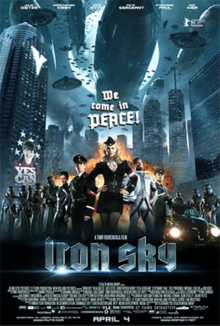Eye For Film >> Movies >> Iron Sky (2011) Film Review
Iron Sky
Reviewed by: Owen Van Spall

Despite the appalling legacy of crimes against humanity the Nazis left behind them, let's admit it, it doesn't take more than a light shove to push the jackbooted, trenchcoated warriors of the master race into the safer realms of camp comedy.
There are no shortage of intriguing theories as to why it remains so satisfying to mine Hitler's regime for laughs. The Nazis were so staggeringly vicious, on such a grand scale, that perhaps only the absurd heights of comedy can really pose as an adequate response, as opposed to a more worthy but doomed effort to address all their horrors into two hours of serious film. Given their predilections for borderline fetishistic leather uniforms, organising legions of robotic goose-stepping youths, and day-long speeches at scream volume about the predestined glory of the master race, the Nazis might as well have painted bullseyes on their chests for the comedians of the world to take aim at.

Artists and comedians seemed to have realised the comedy opportunities from the early days of the Nazis' rise to power in 1930s Germany. During the Second World War, Allied propagandists had fun recutting and re-scoring Nazi rally footage to the soundtrack of silly ditties. Today, the internet allows for essentially the same thing, with Bruno Gantz's epic performance as Hitler in the 2004 film Downfall becoming an internet sensation as hordes of Youtube subscribers re-subtitle the now notorious “meltdown scene” towards the film's end. Chaplin's iconic take on the Fuhrer's pomposity in The Great Dictator, probably remains the ultimate sending up of the Nazis, and is given a respectful nod in one of the better running jokes in Iron Sky.
Director Timo Vuorensola's film sends the Nazis up, too, literally in fact, to the Moon. Drawing on the rich thread of secret weapons theories that has long been part of the Nazi mystique, particularly the Nazi's association with rocket and jet technological developments, the central concept of the film's plot is that, in 1945, the Nazi's fled defeat at the hands of the Allies to form a colony on the dark side of the Moon. Over the 70 years between then and when the film's plot begins, the Nazis were busy building a gigantic space fortress, naturally in the shape of a swastika, and a massive armada of flying saucers that could one day carry them back to Earth where they can conquer the 'untermenschen' once and for all.
What throws their plans into confusion is the sudden arrival of American astronaut James Washington (Christopher Kirby) in a lunar lander, having been launched to the Moon as part of the Sarah Palin-esque American president's re-election campaign. The fact that Washington is black is also a cause for raised eyebrows among the supremacist Nazis, who have their requisite mad scientist convert him into an Aryan with white skin and blonde hair.
Moon Führer Kortzfleisch (Udo Kier) decides the glorious moment of retaking the Earth has arrived sooner than expected, especially as James Washington's tiny smartphone seems to offer the Nazis the advanced technology they need to power their ultimate UFO weapon - the “Gottardammerung” (though the Nazis have been endlessly working on developing weapons technology, there's only so much you can do on the moon it seems and microchip technology appears to have passed them by).
The scheming Nazi General Klaus Adler (Götz Otto), who has his eye on toppling Kortzfleitch, is to be the point man in the Nazi invasion. His first mission is to lead a recon mission to Earth to acquire more smartphones, as Washington's has run out of batteries, a nice if somewhat obvious nod to common complaints about smartphones, and maybe also a dig at Apple's Reich-like dominance.
Arriving on Earth with his Earth history expert and squeeze Renate Richter (Julia Dietze), and the captured Washington, Adler is soon snapped up by the US President's media team. The President's media campaign manager Vivian (Peta Sergeant) sees Adler's Nazi aesthetic and ideological guff as perfect for her election campaign material. Things go awry when Renate inadvertently ends up watching The Great Dictator in a New York arthouse cinema and becomes disillusioned about the Nazis' true motives. Then the enraged Moon Fuhrer also turns up, giant space-zeppelin battlefleet in tow and impatient to begin the attack.
Iron Sky is an international co-production (a €7.5 million production budget from Finland, and the rest from Germany and Australia and fan donations) that drew its funding and its story concepts from a variety of sources, including crowdsourcing via social media. The film seems to reflect this internet-age diversity in the wild medley of ideas thrown at it. Literally every gag or what-if about the Nazis you have ever heard of makes its way on screen, with very mixed results.
The film works best when its gags are presented visually, with the very impressive CGI easily the match in terms of scale and complexity of any major studio's work. The filmmakers delight in using their visual effects' toolkit to parody all the stereotypes of the design aesthetic - plenty of leather, Volkswagens and triumphalist domes and columns - that the Nazis took up to the moon with them. Thus, when Washington is brought in for questioning after his lunar lander is blown up, he is carried in a classic Volkswagen motorcyle and sidecar adapted for lunar buggy work, driven up a network of lunar autobahns. Naturally the Nazi spacetroopers that capture him have managed to incorporate long leather trenchcoats into their spacesuits. The Nazi spacefleet that later attacks Earth is built around the zeppelin concept, with each giant ribbed-hull warship carrying huge chunks of space rocks to be hurled onto the earths major cities as part of the “meteorblitzkrieg” opening salvo.
Sadly, there is not a funny enough script or any particularly amusing performance to provide a backbone to hang the visualisations on, leaving Iron Sky as a more of a showcase for what low-budget filmmaking can achieve in terms of effects. The script mostly has the characters parading around with a variety of exaggerated gestures and outfits, with the jokes very much having that flavour of someone writing in their second language. Otto as Adler, has little to do except snarl and grin wolfishly as he moves closer to world domination. Dietz gets a slightly more interesting plot thread as she slowly discovers that the beatific Nazi image of unity and strength she teaches in class in practice requires subjugation with extreme prejudice. The narrative spends an inordinate amount of time playing out Washington's plot thread as he rants against his Aryanisation, a quite frankly bizarre and awkward scenario that is never once amusing. It's about as close as the film gets to exploring the Third Reich's racial theories, as no mention is made of their anti-semitism at all, the Nazis seemed to have not taken that baggage to the moon with them. Lucky for the filmmakers, then.
The effortless gelling of the Nazis with the modern American conservative movement and it's presidential campaign might have offered a richer vein of comedy - one of the more impressive visual gags sees Adler and Renate framed in a low angle shot standing in New York's Times Square, watching with an air of familiarity the giant video screens above as they project a presidential speech packed with Nazi-esque slogans about unity and honour - but this thread is only sporadically explored and with little subtlety.
The fact remains that the film's central concept of “moon Nazis” is funny enough, but translating that into an actual feature film that holds the interest and the laughs up for 90 - odd minutes requires a defter hand at the wheel. This film would probably be much more effective as a 30-minute, preferably silent, short. Given its low-budget guerilla origins and pulp concept, no-one was expecting a complex masterpiece, but the filmmakers did promise us Iron Sky was going to be funny and it simply doesn't deliver beyond a few smiles.
Reviewed on: 18 May 2012



















